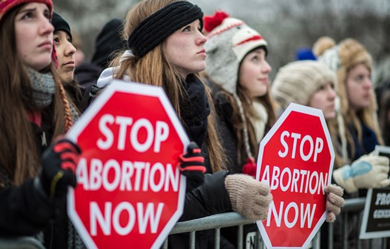Donald Trump’s comment last month that if abortion is recriminalized, a woman who obtains the procedure will have to face “some form of punishment ” was a disaster for his presidential campaign, but did a public service in exposing the real consequences of the anti-choice movement’s agenda.
Abortion rights opponents who have spent years claiming that their efforts to restrict abortion are about protecting women were suddenly faced with a direct question: If you believe that abortion is murder, why shouldn’t a woman who chooses an abortion be treated like a murderer?
Most anti-choice leaders respond with some version of the argument that in the case of an abortion, a woman is a victim rather than a perpetrator, along with vague assurances that no public officials would actually choose to legally punish women for the procedure.
One of these is Frank Pavone, the head of Priests for Life, who responded to Trump’s comment by saying: “We don’t aim to imprison [women], we aim to liberate them from the shame and guilt and wounds abortion brings. The punishment should be for the abortionist, not the baby’s mom.”
But Pavone had a hard time keeping up this argument when, in a recent radio appearance, a sympathetic caller pressed him on the logical fallacy.
Pavone was a guest on “The Drew Mariani Show” on Relevant Radio on Tuesday when a listener named Cory called in to say that he thought Trump was being “remarkably philosophically consistent” on the issue of punishing women for abortion. If a fetus is the equivalent of a five-year-old, he asked, why wouldn’t a woman who has an abortion face the same punishment as a woman who hires someone to kill her five-year-old?
“Because, I mean, we certainly don’t allow a woman who’s an accomplice in the murder of a five-year-old or a six-year-old the privilege of being a victim,” he said. “So I’m not exactly sure how we — we’re not really being that philosophically consistent here with this.”
Pavone responded that the difference was “psychological” and that a woman who had an abortion would probably face a lesser charge because of the amount of “pressure” and “confusion” that she was under to seek the procedure, much like “mitigating circumstances” can mitigate murder charges in the case of a “born person.”
Pavone added that it would also make sense to spare women from punishment so that they would report abortion providers to the authorities, who could then “go after that abortionist and stop him and save other lives.”
Cory, however, was not satisfied with this answer. He pointed out that many women who have abortions “don’t mind having gone through it and they don’t regret it” and repeated that he thought “there should be some sort of legal consequence for a woman who volitionally goes into an abortion clinic knowing what’s going to happen.”
“There has to be some sort of legal consequence, otherwise I just fear that we’re not being logically consistent on this issue,” he said.
Pavone’s answer was essentially “we’ll see.” He told Cory that once an abortion ban is enacted, there would be many options for enforcing it, including penalizing “accomplices” who help a woman get an abortion.
“I mean, the abortionist has to get punished, but what about the person who brings her to or pays for the abortion?” he asked. “So the law can look at a lot of things.”
Pavone then seemed to open the door for the possibility of punishing women who are insufficiently remorseful about having an abortion. “What you have to do,” he said, “is look at each circumstance very carefully, and just like we do with the murder of born people, what were the — how guilty, how responsible, how free was this person, how much did they know and intend what was going on?”
Jay Sekulow, who heads the Religious Right legal group founded by Pat Robertson, has similarly hinted at his willingness to accept legal punishments for women who choose abortions for what he deems to be the wrong reasons.






